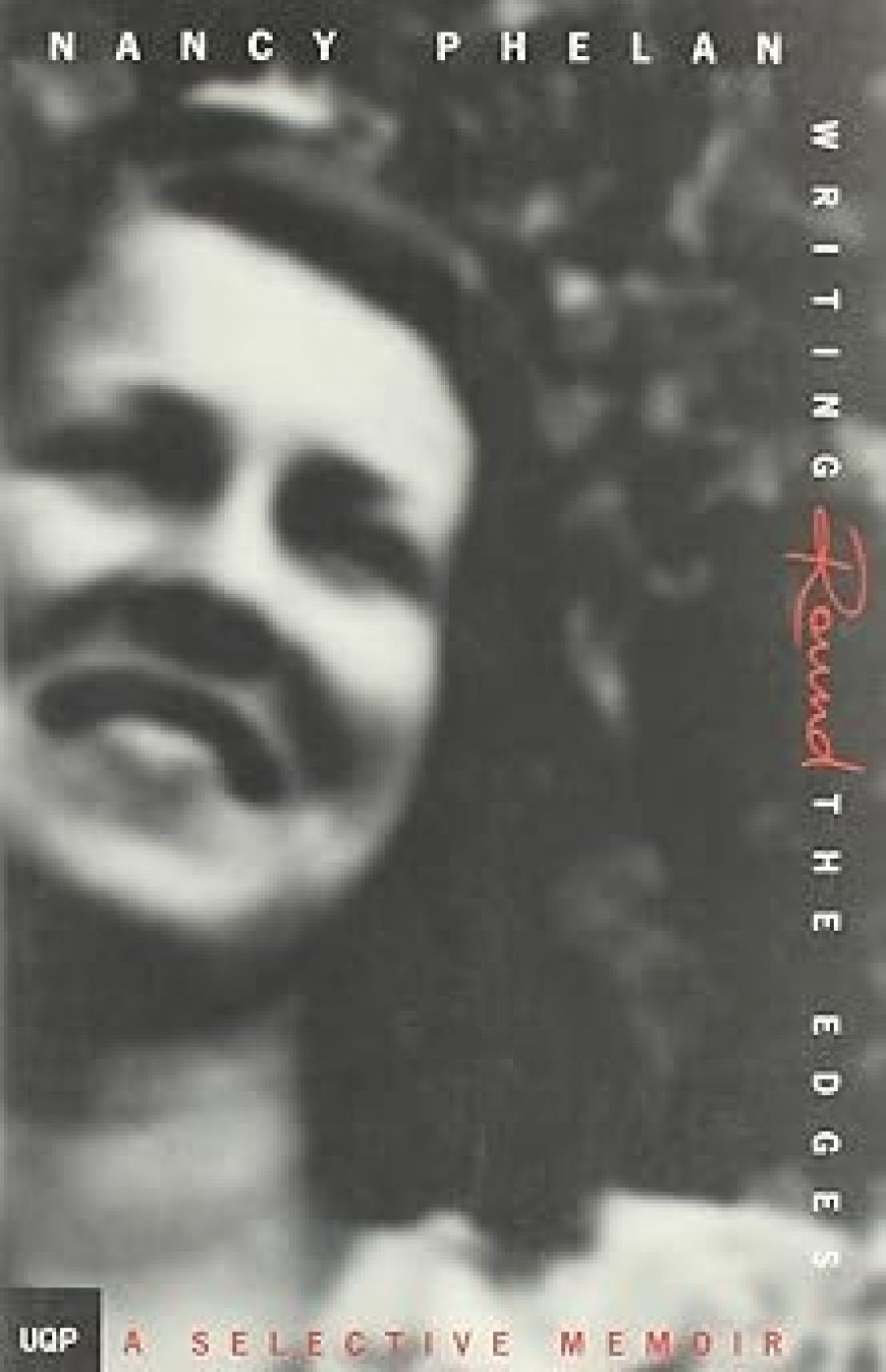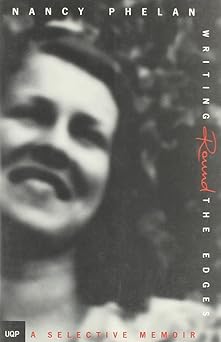
- Free Article: No
- Contents Category: Memoir
- Review Article: Yes
- Article Title: Elegance and Wit
- Online Only: No
- Custom Highlight Text:
Nancy Phelan’s Writing Round the Edges is a stylish and beautifully written memoir by one of Australia’s best-known and most prolific writers. Besides previous autobiographical works, Phelan has published four novels, a number of travel books, biographies of Charles Mackerras and Louise Mack (her aunt), as well as, collaboratively, books on yoga and Russian cooking. Winner of the Foundation for Australian Literary Studies Award in 1988, she has also been shortlisted for a number of national prizes, including the Miles Franklin Award.
This memoir is selective in that its three sections – ‘Seafaring Days’, ‘With the Tide’ and ‘The Gatehouse’ – move in and out of the time continuum, omitting blocks of experience such as Phelan’s life in England during World War II and her work for the South Pacific Commission. These were covered in earlier writings. Passages crammed with anecdotes are interspersed with whole chapters devoted to particular people such as Jill Neville and Dorothy Hewett (to whom the book is dedicated), and the narratives often overlap. There is a moving chapter on the Russian funeral of her friend Paul and a number of lyrical chapters on the changing aspects of deeply loved places: Sydney Harbour and the Blue Mountains. For me, the elegant descriptions of Australian scenery, and especially its birdlife, are highlights of the book.
- Book 1 Title: Writing Round The Edges
- Book 1 Subtitle: A Selective Memoir
- Book 1 Biblio: UQP, $24 pb, 257 pp
- Book 1 Cover Small (400 x 600):

- Book 1 Cover (800 x 1200):

There are few more delicate and perceptive accounts of childhood and adolescence than the first section, ‘Seafaring Days’, provides. The omens were good. Phelan belonged to a large, affectionate and cultured family, some of whom, such as Charles Mackerras, later became famous. Growing up beside Sydney Harbour, she is aware of its stunning beauty, but also of its many moods, a changeability that is reflected in her own inner life. The long summer when the children ‘swim, loaf, sunbake stretched on hot sand’ or ‘express surplus energy in horseplay, flicking with towels, lashing with seaweed, chasing, screaming, ducking’ is disturbed by adolescence. The writing is oblique. There is a sense of ‘an electric current abroad’, an ‘almost physical feeling of opening-up, like petals unfolding’, followed by moments of secret sensuality: ‘I stroke my arms and shoulders, feeling them, moulding them, licking dried salt from my skin.’
Phelan tells of certain ‘subtle and strange and powerful’ feelings that will lead her, later on, to rebel against the predictability of her life and that, incidentally, will account for much of the depth and subtlety of her writing. Her ambivalent attitude towards Australian nature, her sense of its menace as well as its extraordinary beauty, is one of the central truths of Writing Round the Edges. The other is her empathy with people, her gift for friendship. Yeats’s words on the subject – ‘Think where man’s glory most begins and ends, / And say my glory was I had such friends’ – come to my mind again and again as I read this memoir.
For much of her long life, Phelan has been involved in the literary scene. Poets and novelists such as Christopher Brennan, Henry Lawson and Dulcie Deamer (‘in a leopard skin doing the splits at Kings Cross’) were either friends of her family when she was a child or she encountered them in her teens. Her postwar involvement in the Sydney literary community was centred on Kylie Tennant, Nancy Keesing, Elizabeth Harrower, and the publisher Macmillan. This is recorded in ‘With the Tide’. The final section of the book, ‘The Gatehouse’, moves to the Blue Mountains where the old stone house at Lawson, with its garden designed by Paul Sorensen, becomes the centre of a lively and convivial literary culture.
Phelan is obviously a gracious and generous friend, but her judgments are shrewd. She tolerated Xavier Herbert and Hal Porter, often considered personally obnoxious, but with qualifications. Of Herbert, she says: ‘People said he was paranoid, a menace, a bore, but I didn’t mind listening to his rigmarole when we met.’ Patrick White was a frequent guest. She speaks of his ‘[o]ld-fashioned loyalty, a side of his character we didn’t hear much about except from those he had been good to’. Harrower was ‘generous, loyal, affectionate and understanding’, and Jessica Anderson faintly formal, with ‘almost a hint of caution’. Jill Neville, she says, was ‘wild but civilised, dégagée yet compassionate, free-and-easy bohemian but with natural good manners and old-fashioned standards of behaviour’. Phelan came late to her intense friendship with Dorothy Hewett, but discerned in her ‘something young and vital’, something remaining of ‘the child with the wheaten hair’.
Phelan’s friendship with Tennant is woven through the narrative and, despite Tennant’s apparently difficult personality, this close relationship lasted for half a lifetime. She comments on Tennant’s ever-changing personas and anti-intellectual poses, and above all on a certain reserve, even with her closest friends. Tennant’s autobiography The Missing Heir (1986) is perhaps the key to her personality. According to Phelan, it is ‘a masterpiece of how to tell the truth without telling it’, to give the facts ‘without revealing the essence, the emotions behind the actions’.
Phelan has the cartoonist’s gift, the ability to capture both appearance and personality in a few impressionistic lines, such as those on Harold Macmillan: ‘His fine silky whiter-than-Omo hair and moustache had the purity and gloss of uncooked meringue … He spoke in a comfortable purr and with his snowy front and paws was like a very clean, very well-cared-for pussy cat’; or the vision of Edith Sitwell, who, on a visit to Sydney:
received us lying on her bed like a great porcelain doll, wearing a long black dress and black picture hat. She was amazingly pale and fragile … She held out a white and beautiful hand with enormous aquamarine rings and said to each of us, in a booming voice, ‘Howjadoo? Howjadoo?’
Memorable anecdotes include Phelan ferrying a spectacularly drunk Porter home from a Macmillan party in her car. He was ‘haughty and truculent, walking as though on an eiderdown, raising his feet high and lowering them carefully and deliberately’. She tells of seeing off a drunk and abusive Frank Hardy or, later in the mountains, scraping the ‘green slime’ from Tennant’s home-made chutney. Then there is the Japanese professor who, seeking literary acquaintance, visits the gatehouse. In a letter to Norma Chapman, he writes: ‘I will always remember with pleasure the day when you and I were joined together at Mrs Phelan’s villa.’
Nature, to Phelan, has two faces, one of great beauty, benign like the Harbour and the mountains in their most pleasing aspect, another much more threatening. When the mists rise from the valleys and the clouds roll in, there is always the foreboding, the sense not just of menace but of the total indifference of nature: ‘really,’ she says, ‘nothing belongs here but nothingness.’ Phelan has experienced tragedy – the sudden death of her brother just after the war in which he had survived torpedoing in the Indian Ocean and a prison camp in South Africa, and the loss of her husband after a long and happy marriage. Yet she is indomitable. She concludes her memoir with the miraculous regeneration of the bush after the fires of 2002: ‘life is streaming up, bursting out from the trunks in green clusters, so close, so thick that the charred stumps seem swathed in bright feather-boas.’ This could well image her own capacity to survive and flourish, to publish, in her ninetieth year, such an elegant and witty memoir.


Comments powered by CComment